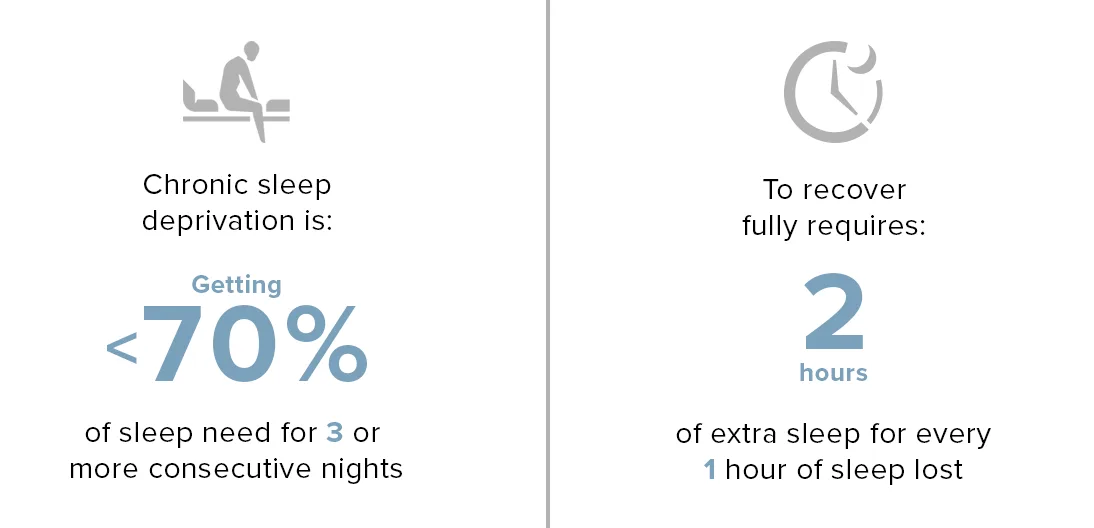Topics
- Article
- HRV
- Sleep
Doctor Explains Sleep Deprivation and How it Affects HRV

Dr. Allison Brager discusses what it means to be sleep deprived, some typical causes of it for athletes, as well as its impact on heart rate variability.
Athletes and everyday heroes recognize that sleep deprivation is unavoidable. Certain athletic circles such as swimming and rowing embrace the pre-dawn training practices. The military and medicine use sleep deprivation during training and residency as a selection tool. Successful businesses embrace late night “brainstorming” sessions to move the needle forward. But, there’s a difference between acute sleep deprivation and chronic sleep deprivation. The former can be mitigated while the latter has significant consequences. In recent years, the NCAA and US Olympic Committees have assembled sleep task forces that I have been fortunate enough to be a part of that are designed to mitigate the physical, cognitive, and interpersonal consequences of sleep deprivation.
What is Sleep Deprivation? Acute vs Chronic
First, what is the difference between acute and chronic sleep deprivation? Acute sleep deprivation is a single bout of sustained wakefulness separated by a period of rest. An example would be a student pulling an all nighter or a soldier doing a night watch. Chronic sleep deprivation is more complex and more pervasive. Chronic sleep deprivation as defined by those of us in leadership positions with the Sleep Research Society (Luyster et al. 2012) is achieving less than 70% of daily sleep needs for at least 3 consecutive days. An example would be a firefighter doing 16-hour shifts for 3-4 days followed by a few days of rest. Ultimately, chronic sleep deprivation requires a dire need for recovery sleep of a 2:1 ratio (2 hours of additional sleep for every hour lost) in order to protect against one of several cardio metabolic, neurobehavioral, and catabolic consequences of chronic sleep deprivation which we have extensively reported on (Good et al. 2020).

The Definition of chronic sleep deprivation and what is necessary in order to properly recover from it.
4 Ways Athletes Experience Sleep Deprivation
There are several ways that athletes experience both types of sleep deprivation. In light of this, this is why tactical napping and having disciplined bedtime and rise-time routines are important.
1. Early morning practice
Rowers and swimmers are very familiar with this cultural norm. Early mornings require early bedtimes but, this can be extremely challenging for collegiate athletes; not just because of school but also because the body is biologically programmed to go to bed later and wake up later across adolescence and early adulthood (Crowley et al. 2007).
2. Late night games
Football (American and European) and hockey players definitely know this struggle. A few years ago, we did a longitudinal assessment of sleep/wake patterns of a Division I football program across the season. We found that late-night games, practices, and bedtimes in general got progressively later across the season (Burke et al. 2020).
3. Performance-related
I recently helped to write what will soon be the first textbooks on sleep health in athletes. No matter the level of eliteness, athletes get nervous! In fact, if you aren’t nervous, then are you really trying or do you really care? This is why a good night of sleep two days prior to the start of competition is most important. Most athletes don’t sleep well the night before.
4. Training-related
The difference between performance-related and training-related sleep deprivation is overtraining. One of the most predictive factors of overtraining is poor sleep.
How Sleep Deprivation Impacts HRV
The consequences of sleep deprivation are systemic. One system most impacted is the cardiorespiratory system. In general, sleep deprivation leads to hyper-activation of the sympathetic nervous system. Sustained wakefulness elicits a global stress response that is sustained by the hypothalamic-pituitary-axis (HPA). Because of this, heart rate variability decreases (Bourdillon et al. 2021). The sympathetic nervous system is activated longer leading to a decreased rate at which the parasympathetic is triggered. Sleep deprivation also increases cortisol release which further promotes a global-wide systemic stress response. This is why chronic sleep deprivation as measured by WHOOP leads to an overall reduction in HRV and a poorer recovery. To conclude, sleep deprivation is not what the cool kids are doing. Sometimes, it is unavoidable but there are plenty of holistic hacks to mitigate it. Check out my appearance on the WHOOP Podcast to learn more! References: Luyster FS, Strollo PJ Jr, Zee PC, Walsh JK; Boards of Directors of the American Academy of Sleep Medicine and the Sleep Research Society. Sleep: a health imperative. Sleep. 2012 Jun 1;35(6):727-34. Good CH, Brager AJ, Capaldi VF, Mysliwiec V. Sleep in the United States Military. Neuropsychopharmacology. 2020 Jan;45(1):176-191. Crowley SJ, Acebo C, Carskadon MA. Sleep, circadian rhythms, and delayed phase in adolescence. Sleep Med. 2007 Sep;8(6):602-12. Burke TM, Lisman PJ, Maguire K, Skeiky L, Choynowski JJ, Capaldi VF 2nd, Wilder JN, Brager AJ, Dobrosielski DA. Examination of Sleep and Injury Among College Football Athletes. J Strength Cond Res. 2020 Mar;34(3):609-616. Bourdillon N, Jeanneret F, Nilchian M, Albertoni P, Ha P, Millet GP. Sleep Deprivation Deteriorates Heart Rate Variability and Photoplethysmography. Front Neurosci. 2021 Apr 8;15:642548.